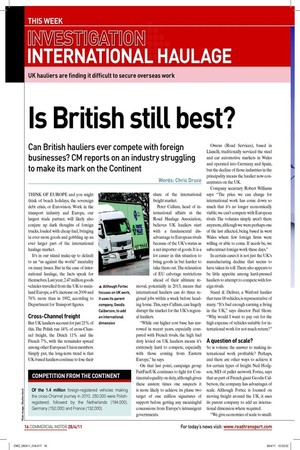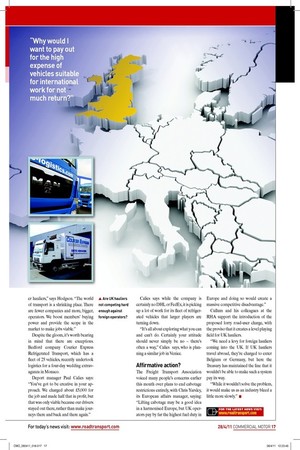Is British still best?
Page 12

Page 13

If you've noticed an error in this article please click here to report it so we can fix it.
Can British hauliers ever compete with foreign businesses? CM reports on an industry struggling to make its mark on the Continent
Words: Chris Druce
THINK OF EUROPE and you might think of beach holidays, the sovereign debt crisis, or Eurovision. Work in the transport industry and Europe, our largest trade partner, will likely also conjure up dark thoughts of foreign trucks, loaded with cheap fuel, bringing in ever more goods and gobbling up an ever larger part of the international haulage market.
It’s in our island make-up to default to an “us against the world” mentality on many issues. But in the case of international haulage, the facts speak for themselves. Last year, 2.47 million goods vehicles travelled from the UK to mainland Europe, a 4% increase on 2009 and 76% more than in 1992, according to Department for Transport igures.
Cross-Channel freight
But UK hauliers account for just 21% of this. The Polish run 14% of cross-Channel freight, the Dutch 11% and the French 7%, with the remainder spread among other European Union members. Simply put, the long-term trend is that UK-based hauliers continue to lose their share of the international freight market.
Peter Cullum, head of international affairs at the Road Haulage Association, believes UK hauliers start with a fundamental disadvantage to European rivals because of the UK’s status as a net importer of goods. It is a lot easier in this situation to bring goods in but harder to take them out. The relaxation of EU cabotage restrictions ahead of their ultimate removal, potentially in 2013, means that international hauliers can do three regional jobs within a week before heading home. This, says Cullum, can hugely disrupt the market for the UK’s regional hauliers.
“While our higher cost base has narrowed in recent years, especially compared with French rivals, the high fuel duty levied on UK hauliers means it’s extremely hard to compete, especially with those coming from Eastern Europe,” he says.
On that last point, campaign group FairFuelUK continues to ight for Continental equality on duty, although given these austere times one suspects it is more likely to achieve its phase two target of one million signatures of support before getting any meaningful concessions from Europe’s intransigent governments. Owens (Road Services), based in Llanelli, traditionally serviced the steel and car automotive markets in Wales and operated into Germany and Spain, but the decline of those industries in the principality means the haulier now concentrates on the UK.
Company secretary Robert Williams says: “The price we can charge for international work has come down so much that it’s no longer economically viable; we can’t compete with European rivals. The volumes simply aren’t there anymore, although we were perhaps one of the last affected, being based in west Wales where few foreign irms were willing or able to come. If needs be, we subcontract foreign work these days.” In certain cases it is not just the UK’s manufacturing decline that seems to have taken its toll. There also appears to be little appetite among hard-pressed hauliers to attempt to compete with foreign rivals.
Stand & Deliver, a Watford haulier that runs 18 vehicles, is representative of many. “It’s bad enough earning a living in the UK,” says director Paul Shore. “Why would I want to pay out for the high expense of vehicles suitable for international work for not much return?”
A question of scale?
So is volume the answer to making international work proitable? Perhaps, and there are other ways to achieve it for certain types of freight. Neil Hodgson, MD of pallet network Fortec, says that as part of French giant Geodis Calberson, the company has advantages of scale. Although Fortec is focused on moving freight around the UK, it uses its parent company to add an international dimension where required.
“We give economies of scale to small er hauliers,” says Hodgson. “The world of transport is a shrinking place. There are fewer companies and more, bigger, operators. We boost members’ buying power and provide the scope in the market to make jobs viable.” Despite the gloom, it’s worth bearing in mind that there are exceptions. Bedford company Courier Express Refrigerated Transport, which has a leet of 25 vehicles, recently undertook logistics for a four-day wedding extravaganza in Monaco.
Deport manager Paul Calies says: “You’ve got to be creative in your approach. We charged about £5,000 for the job and made half that in proit, but that was only viable because our drivers stayed out there, rather than make journeys there and back and there again.” Calies says while the company is certainly no DHL or FedEx, it is picking up a lot of work for its leet of refrigerated vehicles that larger players are turning down.
“It’s all about exploring what you can and can’t do. Certainly your attitude should never simply be no – there’s often a way,” Calies says, who is planning a similar job in Venice.
Affirmative action?
The Freight Transport Association voiced many people’s concerns earlier this month over plans to end cabotage restrictions entirely, with Chris Yarsley, its European affairs manager, saying: “Lifting cabotage may be a good idea in a harmonised Europe, but UK operators pay by far the highest fuel duty in Europe and doing so would create a massive competitive disadvantage.” Cullum and his colleagues at the RHA support the introduction of the proposed lorry road-user charge, with the proviso that it creates a level playing ield for UK hauliers.
“We need a levy for foreign hauliers coming into the UK. If UK hauliers travel abroad, they’re charged to enter Belgium or Germany, but here the Treasury has maintained the line that it wouldn’t be able to make such a system pay its way.
“While it wouldn’t solve the problem, it would make us as an industry bleed a little more slowly.” ■














































